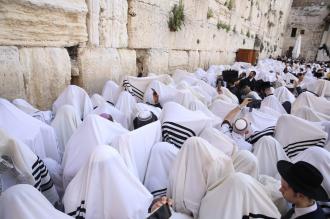“Va’y’hee ba’yom ha’shemini kara Moshe l’Aharon u’l’vanav u’l zeeknei Yisrael w It was on the eighth day, Moshe summoned Aaron and his sons and the elders of Israel" Leviticus 9:1
At the end of the previous Sidrah, Aaron and his sons were instructed to remain at the Tabernacle for seven full days while Moshe performed the inauguration service, which began on the twenty-third of Adar. Each day for seven days, Moshe erected the Tent of Meeting, performed the entire service himself, and disassembled the Tabernacle when the service was done. The inauguration period climaxed with the consecration of Aaron and his sons as Kohanim on the eighth day. Our Sidrah begins on the first day of Nissan, the eighth day of the inauguration service – on that day, the Tabernacle was erected permanently and the Kohanim assumed their new roles [Artscroll Stone Chumash].
This week’s divrei Torah are by R’ Moshe M. Lieber [Artscroll Torah Treasury], with emendations.
*******************************************
The Talmud [Megillah 10b] explains that the term va’y’hee (and it was) indicates an unpleasant occurrence, while the term v’haya (and it will be) connotes a joyous happening.
The Dubno Maggid zt”l explains why the words are used in this way: haya (it was) indicates the past tense. However, adding the transformative “vav” to the front of the word makes it v’haya, and the word is changed into the future tense – implying that when something brings us happiness (in the past), we hope that it will continue to bring us happiness in the future. On the other hand, y’hee (will be) indicates the future tense. The transformative “vav’ affixed to the front of the word makes it va’y’hee, and the word is now converted into the past tense – implying that the prospect of an unhappy event makes us want to quickly move it into the past.
The Talmud (in Megillah, op. cit.) goes on to tell us that the day the Tabernacle was established (i.e. ba’yom ha’shemini …) was, for G-d, as joyous a day as the day that He created the heavens and the earth! Why, then, is the somber term va’y’hee employed, expressing something unpleasant?
Here is how we can understand this:
When G-d first created the world, the entire universe was to be His Sanctuary – there was no need for a special “Tent of Meeting” or any other specially designated meeting place. However, as a result of Adam’s sin, the entire world could no longer serve in that capacity. Two thousand four hundred and forty-eight years later, when the Jewish people left Egypt and accepted the Torah at Mount Sinai, it finally seemed that the world would be restored to its original state and G-d’s original plan. However, as a result of the sin of the Golden Calf, this too was not to be. So, in its stead, G-d granted us the ability to create a miniature world, a Sanctuary in the desert, where His Presence would ‘reside’.
On the one hand, the day that the Tabernacle was erected caused G-d to rejoice as on the day of the Creation of the World – because finally there was to be a Sanctuary for His Presence! However, that joy was tinged with sadness – for the Tabernacle was only a replacement and a shadow of the original, more grandiose plan originally envisioned by the Creator [Zekan Aharon].
In a homiletical vein, R’ Chaim Meir of Vizhnitz zt”l comments that there is a general “eighth day” which also connotes an unhappy state of affairs: There are seven days of the week. On the first six days, a Jew is engaged in the mundane work of the world, causing his soul’s inherent spiritual brilliance to become dull and sullied. But on the seventh day – the holy Sabbath – every Jewish soul can be granted a fresh start; indeed, the Hebrew letters which spell out Shabbos [SHIN • BAIS • TAV] are the same as ta’shuv [TAV • SHIN • BAIS] (i.e. to repent, return and rejuvenate). Thus, the next day (Sunday) is not just the “eighth day” of the previous week’s cycle, but rather the first day of a brand new sequence of events and discovery!
For the non-observant Jew who does not take advantage of the purifying powers of the holy Sabbath, the day after Shabbos is simply a continuation of the previous week – i.e. it is only the “eighth day” of a mundane cycle wherein the soul is still caught up in an ordinary cycle of worldly events. Thus, it is truly va’y’hee ba’yom ha’shemini – an unpleasant “eighth day” that occurs without the restorative powers of Shabbos kodesh.
Summoning the Elders & A ‘Remnant of the Scholars’
“Va’y’hee ba’yom ha’shemini kara Moshe l’Aharon u’l’vanav u’l zeeknei Yisrael w It was on the eighth day, Moshe summoned Aaron and his sons and the elders of Israel" Leviticus 9:1
“Rabbi Akiva says: The Jewish people are compared to a bird – just as a bird cannot fly without wings, so too the Jewish people are helpless without their Elders” [Vayikr Rabbah 11:8].
A different Midrash [Bereishis Rabbah 65:4] tells us that originally Yitzchak Avinu looked exactly like his father, Avraham. When Avraham took notice of this, he asked G-d to make him look older than his son, Yitzchak, so that people would not confuse them. Avraham reasoned, “Master of the Universe! If I happen to go someplace with my son, people will not know who is who and will not know to whom to give the proper respect and honor. Only if we are crowned with outward signs of age will people know to whom to respect.” And G-d answered Avraham, “That is a good argument – and I will begin with you!” And this is the meaning of the verse, “And Avraham was old … and G-d had blessed Avraham with everything” [Genesis 24:1].
After having read this supplementary Midrash, we must ask: Was it so important to Avraham Avinu that people accord him respect and honor? After all, we know that in his humility he himself would go out to wash the feet of his guests when they arrived at his tent! He was the one who personally made sure that all of their needs were met! Does this sound like someone who is running after respect and honor?
No – Kehillas Yitzchak zt”l explains that Avraham was concerned that there was a danger in the young and the old being indistinguishable. The wisdom and life experience of older people gives them the ability to offer guidance and advice with the proper balance of knowledge and understanding. As a general rule, young people lack this knowledge and insight. Therefore, Avraham Avinu was afraid that if the young and the old were indistinguishable, then people might unwittingly seek counsel from the young and thereby forfeit the wisdom and understanding of the old; Avraham thus asked G-d to provide every person with the appropriate outward signs of aging.
As Rabbi Akiva taught, the Jewish people are like a bird – just as a bird’s ability to soar depends upon its wings, so, too, the ability of each Jewish generation to successfully rise above its challenges depends upon its elders offering guidance and direction. At the inauguration of the Mishkan, we are thus told that “Moshe summoned Aaron and his sons and the elders of Israel” – their presence at this vital moment in our history was indispensable.
*******************************************
In our Shemoneh Esrei prayer, we ask G-d to show compassion to “the righteous, the devout, the elders … and to the remnant of the scholars of the Jewish people.” Just who are the “remnant of the scholars” that are not included in the first three categories of “the righteous, the devout, and the elders”?
Rav J.B. Soloveitchik zt”l writes that the chain of tradition is viable only if every generation has ‘bridge-figures’ who are the ‘remnants’ of earlier times. These people are the living link between the past and the present; they are the ‘remnant of the scholars of the Jewish people.” The significance of their having this title goes beyond their being “righteous, devout, or the elders” of the present generation; rather, they are the critical remnants and ‘bridge-figures’ of the previous generation.
















